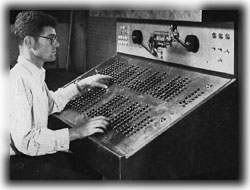Main Menu · Search ·Current Issue ·Contact ·Archives ·Centennial ·Letters to the Editor ·FAQs
 Mark III boasted a special coding box that significantly speeded up the input of instructions to the computer. |
Where 622 freshmen registered last year, now there are 704. The editors suggest that new freshman dorms and scholarships have made the College more attractive, and also credit the past year's efforts to publicize Harvard nationally.
The editors warn: "Princeton will not allow its undergraduates to keep them. Stevens, head coach at Yale, has forbidden his football squad to ride in them during the season....If undergraduates are less in their rooms today, and consequently less accessible to the knowledge of one another and of books; if they are more in the company of girls, more addicted to dancing and visiting, thanks are largely due to the automobile."
American Ballads and Folk Songs, compiled by John A. Lomax, A.M. '07, and Alan J. Lomax '34, with a foreward by Professor George Lyman Kittredge, is praised as evidence that America, "at least the part of the population which has not been trammelled by excess of schooling, is in fact a singing land."
An article in the New York Times headlined "Harvard Descends on Student Communists; Burns 5,000 Soviet-Hitler Pamphlets" prompts an immediate reply from the Corporation denying destruction of the circulars; pointing out that student leafletters had simply broken a rule requiring distribution of printed matter by mail, not in person; and denouncing an alleged "quiet drive by the University authorities against student communism" as "utterly incompatible with the well-known traditions of academic freedom in Harvard University."
A former Wellesley College instructor in political science, Julia J. Henderson, has won a Littauer Fellowship, making her the first woman admitted to the Graduate School of Public Administration since its founding in 1937.
Professor Howard Aiken draws 800 mathematicians, engineers, physicists, social scientists, industrialists, and laymen to a Large-Scale Digital Calculating Machinery Symposium that coincides with the unveiling of Mark III. Although the 10-ton Bakelite and steel structure will be shipped to the navy after final tests, the gathering discusses how such machines could be used to work on problems in the social sciences, physiology, psychology, and other areas.
Professor Robert Burns Woodward has achieved the total synthesis of strychnine, the most complex of ordinary-sized molecules--a milestone in organic chemistry.
Instead of repairing the rundown House squash courts on Dunster Street, Harvard will tear down the building and leave the quadrangle between Kirkland House and Lowell House an open area.
The College debuts a full-year introduction to physical chemistry and quantitative analysis, "for men with a strong preparation in science."
A burglar tries to steal Widener Library's two-volume Gutenberg Bible (worth roughly a million dollars), but falls from a rope into the library courtyard, breaking his leg and cracking his skull.
A proposal to extend the subway farther north has triggered discussions about overall planning for Harvard Square. Among the top questions: Should the Kennedy Library be built in Cambridge after all? What should be the policy on cars in the Square? What are Harvard's long-range plans, and how will they affect the city?
Harvard announces the official start of a long-planned capital-fund drive to raise $250 million in the next five years.